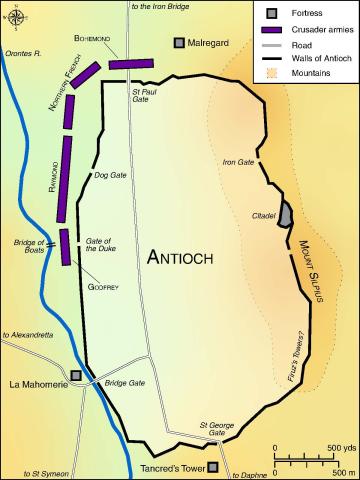The Capture of Antioch
[8.20.2] Nōn multō post, audīvimus nūntiōs dē exercitū hostium nostrōrum, Turcōrum, Pūblicānōrum, Agulānōrum, Azimītārum, et aliārum plūrimārum nātiōnum; statimque adūnāvērunt sē omnēs māiōrēs nostrī simul, tenuēruntque concilium, dīcentēs quoniam “sī Boamundus potuerit acquīrere cīvitātem aut per sē aut per aliōs, nōs ūnā libentī corde ultrō eī dōnāmus, eō tenore ut sī imperātor vēnerit nōbīs in adiūtōrium, et omnem conventiōnem nōbīs (sīcut prōmīsit et iūrāvit) attendere voluerit, nōs eī eam iūre reddēmus. Sīn autem, Boamundus eam in suam habeat potestātem.”
[8.20.3] Mox itaque Boamundus coepit humiliter amīcum suum cotīdiānā dēprecārī petītiōne, prōmittendō humillima, maxima, et dulcia, in hunc modum: “Ecce vērē tempus modo habēmus idōneum, in quō possumus operārī quicquid bonī volumus; ergō adiuvet mē nunc amīcus meus Pirrus.” Quī, satis gāvīsus dē nūntiō, ait sē illum adiuvāre omnīnō, sīcut agere dēbēret. Nocte itaque veniente proximā, mīsit cautē fīlium suum pignus Boamundō, ut sēcūrior fieret dē introitū urbis. Mīsit quoque eī verba in hunc modum, ut in crāstinum omnem Francōrum gentem summonērī faciat, et quasi in Saracēnōrum terram depraedārī vadat dissimulet, ac deinde celeriter revertātur per dextram montāneam: “Ego vērō,” ait, “erō intentiōne ērēctā praestōlāns illa agmina, eaque recipiam in turrēs quās in meā habeō potestāte ac cūstōdiā.”
notes
vocabulary
8.20.2
adūnō (1): to make one, unite (LL); put together (ML)
tenor –ōris, m.: line, thought, idea (in a law or document, etc.)
conventiō –ōnis, f.: agreement
sīn: but if; but if (it is otherwise)
8.20.3
dēprecor (1): to pray for, beg for (OLD 3b)
humilis humile: submissive, abject, humble
modo: now
idōneus –a –um: suitable
quisquis quidquid (quicquid): whoever, whatever
omnīnō: entirely
pignus pigneris (pignoris), n.: pledge
summoneō summonēre summonuī summonitum: to summon (ML)
dēpraedor dēpraedārī: to pillage, plunder completely
vādō vādere: to go
intentiō –ōnis, f.: concentrated attention
ērēctus –a –um: attentive, alert (OLD 3)
praestōlor (1): to wait for
agmen –inis, n.: column (of an army); unit (of soldiers)

